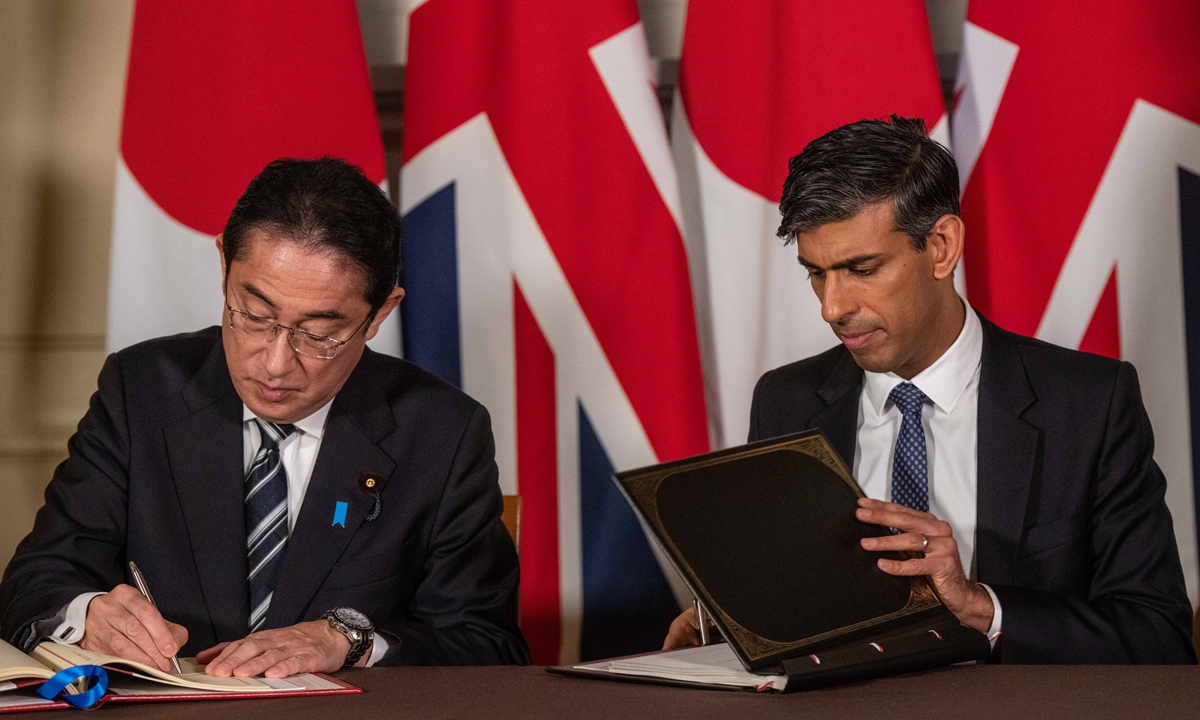
Rishi Sunak (right), British prime minister, and Fumio Kishida (left), Japanese prime minister, during the signing of a defence agreement at the Tower of London in London, UK, on Wednesday. Photo: VCG
A big question mark hangs over whether the UK has the ability or finances to support its ambition to boost its presence in the Asia-Pacific region while its major security focus lies in Europe, said Chinese observers commenting on the signing of the defense pact between the UK and Japan during Japanese Prime Minister Fumio Kishida's visit to London.
Kishida and British Prime Minister Rishi Sunak on Wednesday signed the Reciprocal Access Agreement (RAA). According to the Japanese Foreign Ministry, the Japan-UK RAA is an agreement that establishes procedures between the two sides for cooperative activities conducted by the defense force of one country while visiting the other, and defines a status of the visiting force. The UK is the second country after Australia to sign the RAA with Japan.
The RAA will simplify procedures when implementing cooperative activities, such as port calls of vessels and joint exercises between the two countries and further promoting bilateral security and defense cooperation, according to the Japanese Foreign Ministry.
The Japanese Foreign Ministry cited the "more severe" international security environment in various parts of the world as well as the international order challenged by the Ukraine crisis and so-called "attempts to unilaterally change the status quo by force in the East and South China Seas," claiming that the Japan-UK security and defense cooperation will be lifted to new heights and the movement toward the realization of a so-called "free and open Indo-Pacific" will be further enhanced.
Chinese observers believe that through the pact, the possibility of Japan stationing troops in Britain is almost zero, but the possibility of the UK stationing troops in Japan is quite high.
The UK, especially in the last couple of years, has been looking for chances to return to the Asia-Pacific, the Chinese observers noted.
While the UK is adjusting its foreign and security strategy, there is a strong market for a tough stance against China in British politics and it is difficult for Sunak to maintain a balance. Today's Britain no longer believes that it can maintain its interests and status as a great power only by developing trade and economy, and believes instead that it should now turn to military and security aspects to boost its presence, Cui Hongjian, director of the Department of European Studies at the China Institute of International Studies, told the Global Times on Thursday.
The UK has been building security and trade ties in the region. In September 2021, the UK and allies US and Australia announced the establishment of the AUKUS trilateral security pact, and now the UK and Japan have signed the defense pact, both of which have allowed the UK to bring about its Indo-Pacific tilt in military, diplomatic and political strategy. This marked the UK essentially becoming involved in the geopolitical competition in the region, observers warned.
However, the UK's move goes against the region's mainstream of peace and development, Cui pointed out. As a country with a colonial history in the region, the UK's military presence goes against the historical trend and will draw disgust from the majority of people in the region, Cui told the Global Times on Thursday.
The observer also questioned whether the UK had the ability or finances to support its ambitions. It is also a major test of whether the UK government can afford to play a security role in both Europe and Asia, Cui said, noting that the UK's focus should be in Europe and so-called transatlantic security amid the continuing Ukraine crisis.
Song Zhongping, a Chinese military expert and TV commentator, told the Global Times on Thursday that the UK and Japan could not have come together to sign this agreement without incitement and pressure from the US. The military expert pointed out that the so-called strategies of Japan and the UK have followed the global strategy of the US, as they both want to boost its influence in the Asia-Pacific to achieve so-called regional hegemony and achieve their own goals.
Song said that the possibility of bringing Japan and even Canada into the AUKUS alliance in the near future could not be ruled out, as it could be an important consideration for the US in order to realize its global strategy.
The observers warned China to be on the alert to the Japan-UK defense pact and a potential expansion of AUKUS, as closer military cooperation between the allies could be the first dangerous step by the US in reinventing a global military alliance, which will pose a big threat to regional peace and stability.




